Journaling practices can significantly enhance mental clarity and facilitate emotional healing. This article explores various types of journaling, including reflective, gratitude, and expressive writing. It also addresses how to customize journaling for individual needs and overcome common obstacles. Additionally, we will highlight tools and resources that can enrich your journaling experience.
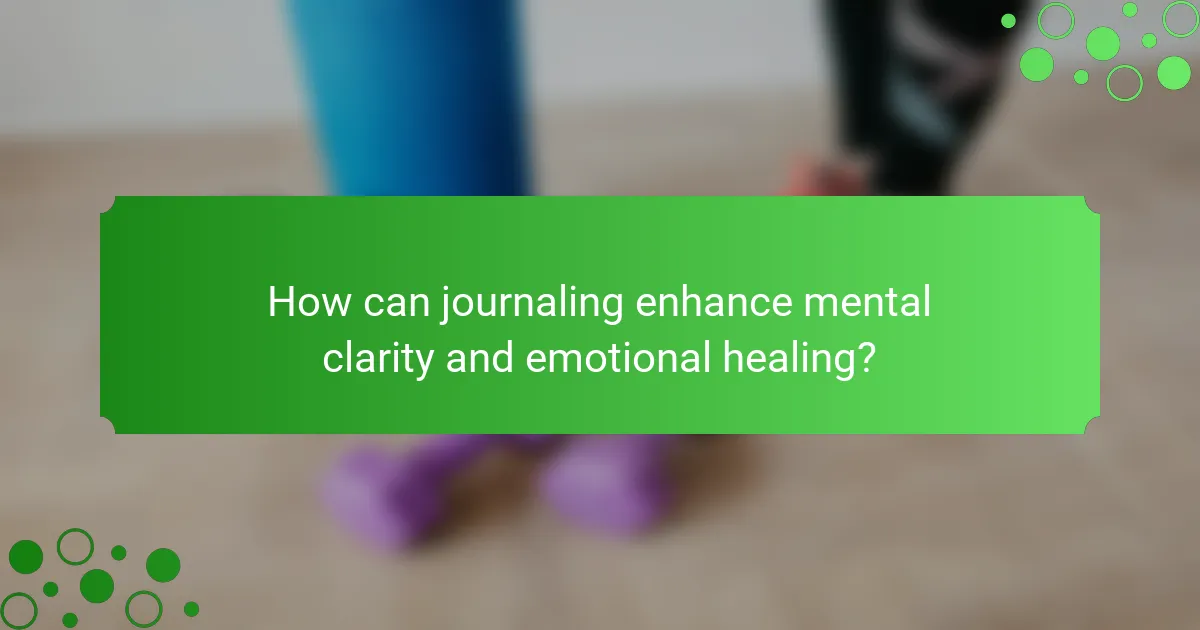
How can journaling enhance mental clarity and emotional healing?
Journaling enhances mental clarity and emotional healing by providing a structured outlet for thoughts and feelings. This practice encourages self-reflection, helping individuals identify patterns and triggers. Writing regularly can reduce anxiety and improve mood by allowing for emotional expression. Studies show that journaling can lead to increased self-awareness and cognitive processing, contributing to overall mental well-being.
What are the psychological benefits of journaling?
Journaling offers significant psychological benefits, including enhanced emotional clarity and stress reduction. It allows individuals to process thoughts and feelings, promoting self-reflection. Regular journaling can lead to improved mood and resilience against anxiety. Studies show that expressive writing can boost overall mental health by fostering a sense of control and understanding.
How does journaling promote self-reflection and awareness?
Journaling enhances self-reflection and awareness by encouraging individuals to articulate thoughts and feelings. This practice fosters clarity, allowing for deeper insights into personal experiences and emotions. Regular journaling can reveal patterns in behavior and thought processes, promoting greater self-understanding. Additionally, it serves as a safe space for exploring complex emotions, leading to emotional healing and improved mental clarity.
Which journaling techniques are most effective for mental clarity?
Effective journaling techniques for mental clarity include free writing, gratitude journaling, and structured prompts. Free writing encourages unfiltered expression, allowing thoughts to flow freely, which can enhance clarity. Gratitude journaling focuses on positive experiences, shifting mindset and reducing stress. Structured prompts guide reflection on specific topics, fostering deeper insights and emotional healing.
What role does emotional expression play in journaling?
Emotional expression is crucial in journaling as it facilitates self-discovery and emotional healing. By articulating feelings on paper, individuals can process experiences, reduce stress, and gain clarity. This practice enhances emotional intelligence, allowing for better understanding and management of emotions. Regular emotional expression through journaling can lead to improved mental health and resilience.
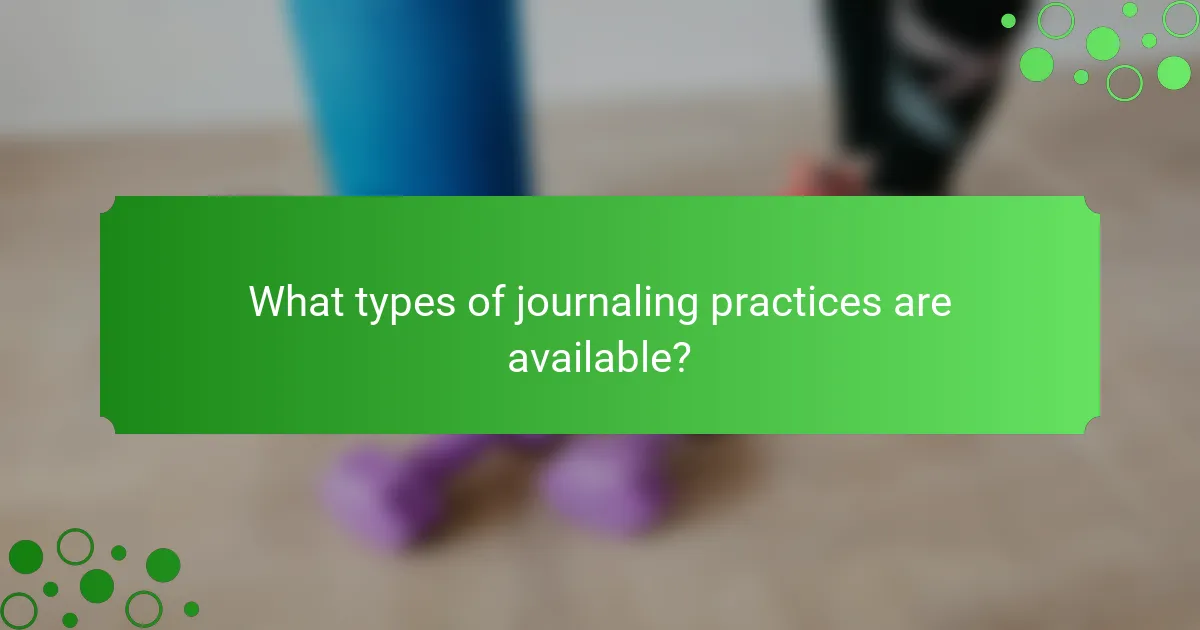
What types of journaling practices are available?
Various journaling practices enhance mental clarity and emotional healing. Key types include reflective journaling, gratitude journaling, expressive writing, bullet journaling, art journaling, and guided journaling.
Reflective journaling focuses on self-examination and personal growth. Gratitude journaling emphasizes positive thinking by listing things one appreciates. Expressive writing allows for emotional release through free-form writing. Bullet journaling combines organization with creativity, using symbols and short entries. Art journaling integrates visual art with writing for deeper expression. Guided journaling provides prompts to facilitate exploration of thoughts and feelings.
Each practice offers unique benefits, catering to different preferences and needs in the journey of self-discovery and emotional well-being.
How does gratitude journaling impact emotional well-being?
Gratitude journaling significantly enhances emotional well-being by fostering positive thinking and reducing stress. Regularly writing about things you are grateful for can lead to improved mood and increased resilience. Studies show that individuals who practice gratitude experience lower levels of depression and anxiety. This journaling practice encourages mindfulness, helping individuals focus on the present and appreciate their lives. Additionally, it can strengthen relationships by promoting empathy and reducing negative emotions.
What is the significance of bullet journaling for organization and mindfulness?
Bullet journaling significantly enhances organization and mindfulness by providing a structured way to track thoughts and tasks. It fosters mental clarity through intentional reflection and planning. Users report improved focus and reduced anxiety. This practice uniquely combines creativity with productivity, making it a powerful tool for emotional healing. The act of writing can serve as a rare form of self-expression, promoting deeper insights into personal challenges.
Which creative journaling methods can enhance emotional healing?
Creative journaling methods that enhance emotional healing include expressive writing, gratitude journaling, art journaling, and guided prompts. These techniques foster self-reflection, promote emotional release, and encourage positive thinking.
Expressive writing allows individuals to explore their feelings freely, reducing stress and anxiety. Gratitude journaling shifts focus to positive aspects of life, improving overall well-being. Art journaling combines creativity with emotional expression, facilitating deeper insights. Guided prompts provide structured reflection, helping to navigate complex emotions.
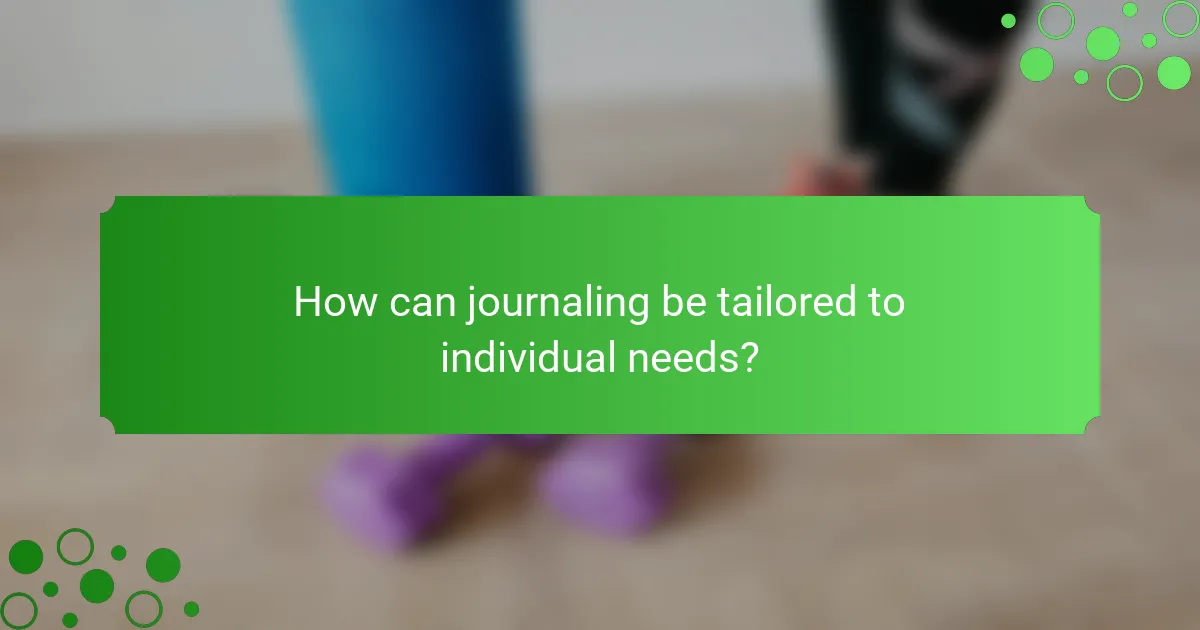
How can journaling be tailored to individual needs?
Journaling can be tailored to individual needs by focusing on personal goals, preferred styles, and emotional triggers. Customizing prompts can enhance self-reflection and clarity.
1. Identify your purpose: Define whether journaling is for emotional healing, stress relief, or self-improvement.
2. Choose a format: Options include free writing, bullet points, or structured prompts to suit your style.
3. Set a routine: Consistency enhances benefits; select a time that fits your lifestyle.
4. Use specific prompts: Tailor prompts to your emotional state or experiences for deeper insights.
5. Reflect on progress: Regularly review past entries to recognize growth and patterns.
By personalizing these elements, journaling becomes a powerful tool for mental clarity and emotional healing.
What factors influence the effectiveness of journaling practices?
Several factors influence the effectiveness of journaling practices, including consistency, emotional openness, and specific goals. Consistent journaling enhances clarity and emotional processing. Emotional openness allows deeper exploration of thoughts and feelings. Setting specific goals guides the journaling process and increases its impact on mental clarity and emotional healing.
How can cultural perspectives shape journaling approaches?
Cultural perspectives significantly influence journaling approaches by shaping themes, styles, and purposes. Different cultures prioritize distinct emotional expressions and reflection methods, impacting how individuals engage with their journals. For instance, in collectivist societies, journaling may focus on community experiences and shared emotions, while individualistic cultures might emphasize personal growth and self-discovery. This diversity enriches journaling practices, allowing for varied forms of intake such as narrative storytelling or structured prompts. Understanding these cultural nuances can enhance mental clarity and emotional healing through tailored journaling strategies.
Which specific challenges can journaling address for different audiences?
Journaling can address various challenges for different audiences, enhancing mental clarity and emotional healing.
For students, journaling helps manage academic stress and improve focus. It allows them to process emotions related to exams and deadlines.
For professionals, it aids in reducing workplace anxiety and enhancing productivity. Reflective writing can clarify goals and priorities.
For individuals facing trauma, journaling offers a safe space to express feelings and work through experiences. It can facilitate healing by promoting self-reflection.
For parents, journaling can assist in managing the emotional challenges of parenting, providing an outlet for frustrations and joys alike.
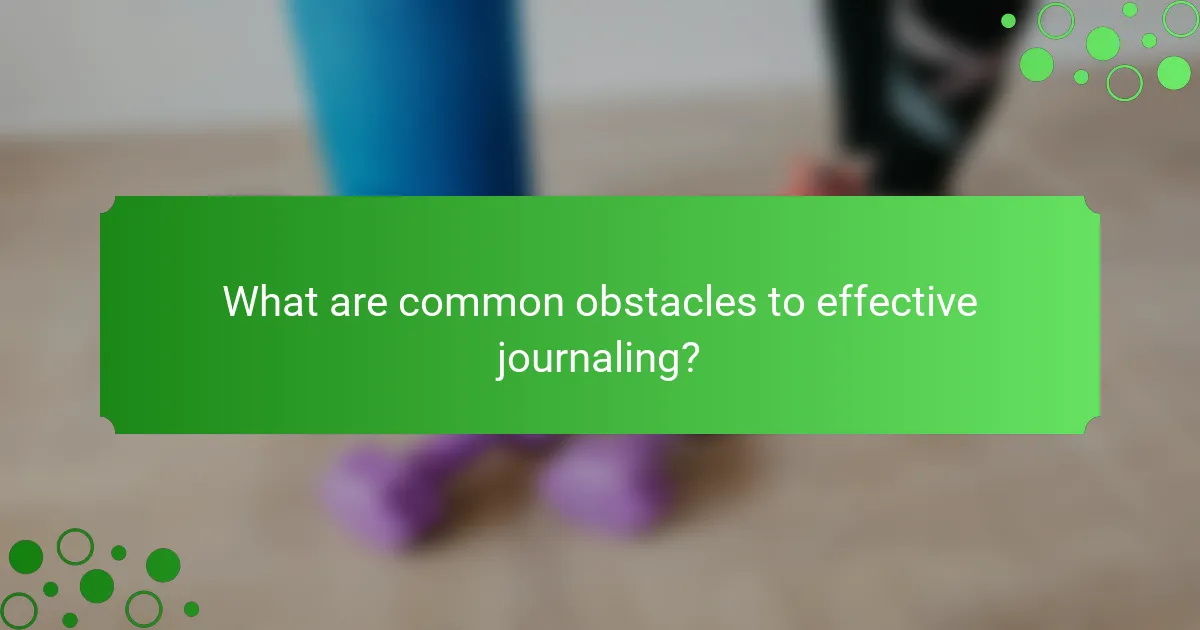
What are common obstacles to effective journaling?
Common obstacles to effective journaling include lack of time, uncertainty about what to write, and fear of judgment. These challenges can hinder mental clarity and emotional healing. Time constraints often lead to inconsistent journaling habits. Uncertainty about content can cause frustration, while fear of judgment may prevent genuine expression. Addressing these issues can enhance the journaling experience, making it more beneficial for emotional well-being.
How can individuals overcome writer’s block in journaling?
Individuals can overcome writer’s block in journaling by implementing structured practices. Establish a routine that includes specific times for journaling to create consistency. Use prompts or questions to spark ideas, allowing for free expression without judgment. Experiment with different formats, such as lists or sketches, to engage creativity. Setting a timer can help limit pressure and encourage a flow of thoughts. Lastly, practice mindfulness techniques to reduce anxiety and enhance focus, fostering a more open mindset for writing.
What strategies exist for maintaining a consistent journaling habit?
To maintain a consistent journaling habit, establish a routine, set specific goals, and create a conducive environment. Start by choosing a dedicated time each day for journaling, making it a non-negotiable part of your schedule. Setting clear goals, such as writing for five minutes or completing a specific number of entries per week, helps in sustaining motivation. Additionally, design a comfortable and inspiring space to write, free from distractions, which enhances focus and creativity.
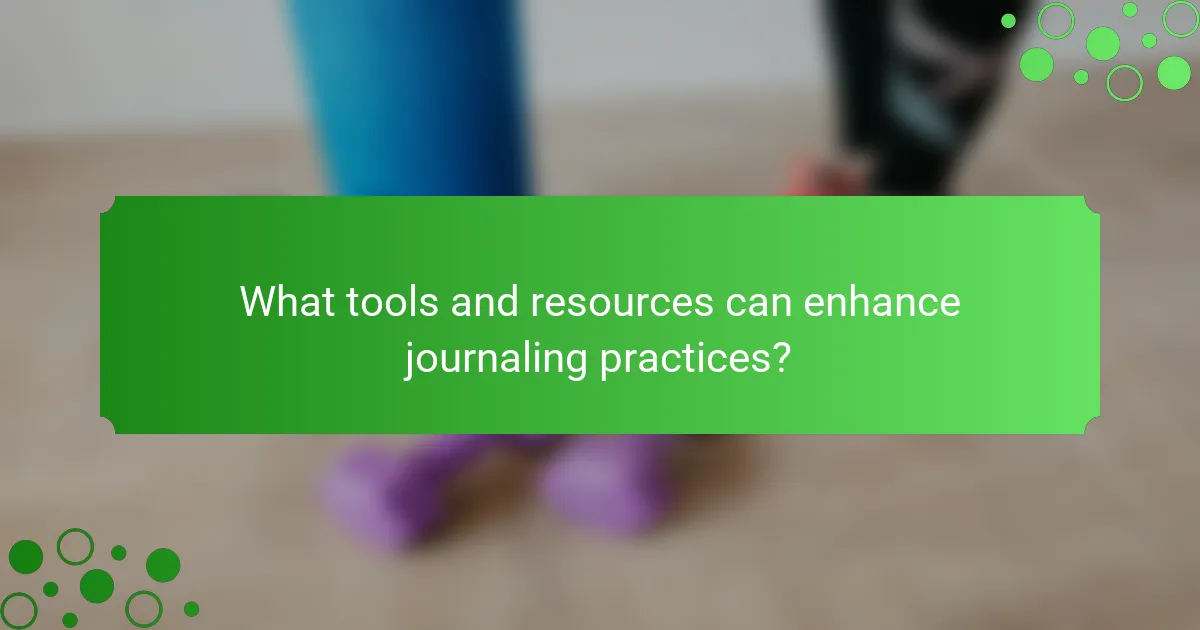
What tools and resources can enhance journaling practices?
Several tools and resources can significantly enhance journaling practices for mental clarity and emotional healing. Digital apps like Day One provide structured formats and prompts, while guided journals offer specific themes for reflection. Mindfulness resources, such as meditation apps, can complement journaling by promoting emotional awareness. Writing workshops or online communities foster support and inspiration, enhancing the journaling experience. Additionally, incorporating art supplies encourages creative expression, making the process more engaging.
Which digital platforms are popular for journaling in 2025?
In 2025, popular digital platforms for journaling include Day One, Journey, Penzu, and Diaro. These platforms enhance mental clarity and emotional healing through user-friendly interfaces and diverse features. Users appreciate Day One for its multimedia capabilities, while Journey offers mood tracking. Penzu emphasizes privacy with encryption, and Diaro facilitates multilingual journaling. Each platform supports reflective practices, catering to individual preferences and enhancing personal growth.
How can guided journals assist in emotional healing?
Guided journals assist in emotional healing by providing structured prompts that facilitate self-reflection and expression. These practices encourage individuals to explore their feelings, identify patterns, and develop coping strategies. Guided journaling can enhance emotional awareness, leading to improved mental clarity and resilience. Additionally, regular journaling has been linked to reduced stress and anxiety levels, promoting overall well-being.
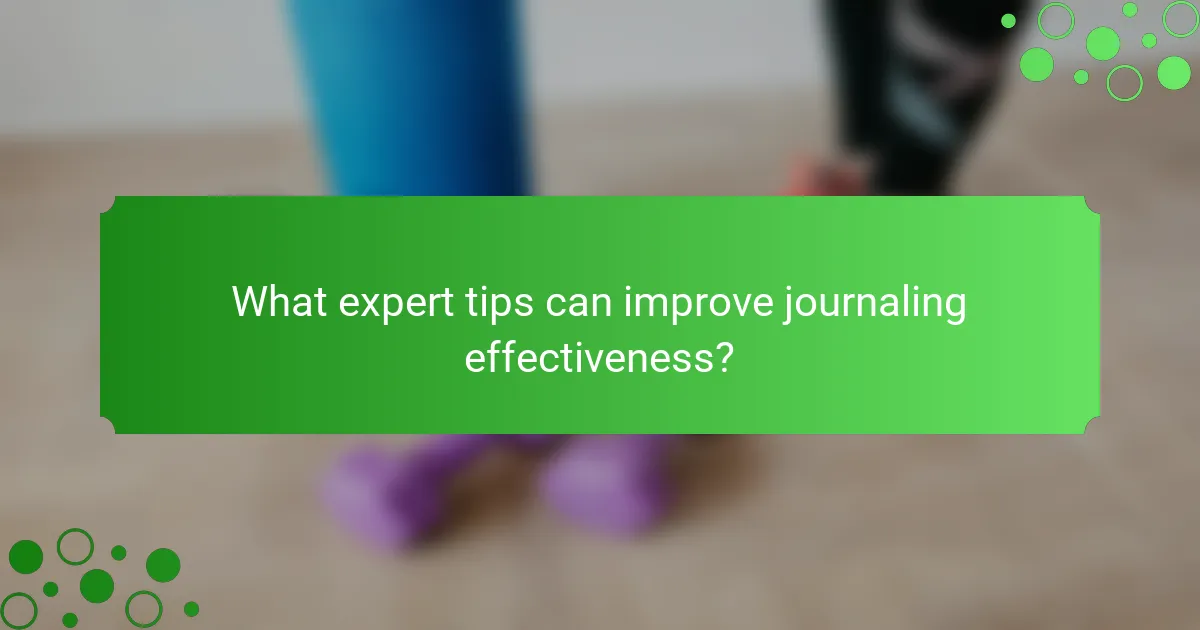
What expert tips can improve journaling effectiveness?
To improve journaling effectiveness, establish a consistent routine, set specific goals, and use prompts. These strategies enhance mental clarity and emotional healing.
1. Set a regular time for journaling to create a habit.
2. Define clear objectives for each session, such as reflecting on emotions or tracking progress.
3. Utilize prompts to inspire deeper reflection, like “What am I grateful for today?”
4. Keep your journaling environment distraction-free to enhance focus.
5. Review past entries to identify patterns and growth over time.
How can individuals personalize their journaling experience for maximum impact?
Individuals can personalize their journaling experience by incorporating unique themes, prompts, and formats that resonate with their emotions and goals. Start by selecting a specific focus, such as gratitude, stress relief, or personal growth. Use creative prompts that encourage reflection and exploration of thoughts and feelings. Experiment with various formats, like bullet points, free writing, or art journaling, to find what feels most impactful. Additionally, establish a consistent routine to enhance the journaling habit, which can lead to deeper insights and emotional healing.
What common mistakes should be avoided in journaling?
To enhance journaling effectiveness, avoid common mistakes such as inconsistency, overthinking, and neglecting emotional honesty. Inconsistent journaling can hinder progress, while overthinking can stifle creativity. Failing to express genuine emotions may limit the healing potential of the practice.
How can journaling be integrated into daily routines for better results?
Integrating journaling into daily routines enhances mental clarity and emotional healing. Start by setting a specific time each day for journaling, such as in the morning or before bed.
Consider keeping your journal accessible to encourage spontaneous entries. Use prompts or themes to guide your writing, focusing on gratitude, reflections, or goals.
Establish a comfortable environment free from distractions to enhance your focus. Aim for consistency, journaling at least three to five times a week for optimal benefits.
Track your progress over time to identify patterns and insights, fostering deeper emotional understanding.